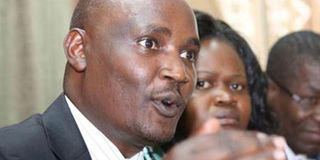Nasa, Jubilee clash over separation of powers doctrine

Minority Leader John Mbadi who said the institutional relationship between the three arms of government is set to remain under intense scrutiny as Kenyans had already defined the territory of each of them. FILE PHOTO | NATION MEDIA GROUP
What you need to know:
The MP was speaking on the first day of the 2017 post-election induction seminar at the Pride Inn Hotel.
Leader of Majority Aden Duale accused the Judiciary of encroaching on the role Parliament.
In his presentation, Mr Mbadi accused the Jubilee Party of misusing its Parliamentary majority in the House.
The National Super Alliance (Nasa) and Jubilee Party have clashed over the doctrine of separation of powers with the former urging the ruling party to stop attempts to muzzle the independence of institutions.
Through its leader in the National Assembly John Mbadi, Nasa said the institutional relationship between the three arms of government is set to remain under intense scrutiny as Kenyans had already defined the territory of each of them and their interface with each other through the 2010 Constitution.
“Jubilee party must strive to promote democratic ideals with its numbers and stop the desire to erode the powers of other institutions. Jubilee should respect the Judiciary by abiding by its orders,” Mr Mbadi, who is also Suba South MP, said.
POST-ELECTION INDUCTION
The MP was speaking on the first day of the 2017 post-election induction seminar at the Pride Inn Hotel, Mombasa Monday.
The seminar is organised by the National Assembly in conjunction with the Commonwealth Parliamentary Association (CPA) and is aimed at giving MPs of the 12th parliament the opportunity to share ideas on how to strengthen experiences in order to promote good governance.
However, the Leader of Majority Aden Duale accused the Judiciary of encroaching on the role Parliament by issuing what he described as whimsical judgements that have undermined the authority of Parliament.
“The Constitution has assigned powers to each of the three arms of government to avoid overlaps. We expect the Judiciary to respect the role of Parliament,” he told the audience that included Deputy Chief Justice Philomena Mwilu.
PARLIAMENTARY MAJORITY
In his presentation, Mr Mbadi accused the Jubilee Party of misusing its Parliamentary majority in the House and pleaded with its leadership to continuously strive to promote democratic ideals both inside and outside Parliament.
However, he told the conference that the opposition was not deterred by the ruling party’s decision to misuse their numbers as it had its own tyranny of brains that have the capacity to offer the necessary checks to Jubilee’s excesses.
“May I remind you that even with your numbers, the responsibility on you is higher and when it comes to law making, you should make a law that you can trust with your enemy,” he said.
Mr Duale particularly noted the recent decisions by the courts which he described as whimsical and whose net effect has been to prejudice the work of parliament.
He cited the 2015 attempt to remove six members of the judicial Service commission through a petition to the National Assembly, which was injuncted by the courts even before parliament could debate it.
During the same time, attempts by the EACC to investigate some judicial officers were rebutted when the PSC declared it had the capacity to investigate the officers.
FINAL VERDICT
Mr Duale said while Parliament respects separation of powers, it would have been prudent for the courts to await the final verdict of Parliament and then review such decision, saying recent decisions against parliament by the courts were done in bad faith.
“It was not proper for parliament to injunct Parliament while it was lawfully discharging its mandate,” he said.
He added: “Do Kenyans need the permission of Judiciary to file petitions in the National Assembly over the removal of some public officers? Should Parliament seek permission from Judiciary before it deals with petitions brought before it?”
Lawyer Nzamba Kitonga however said the conflict between the three arms of government is healthy as it is a manifestation of coherent working relationship, but warned against attempts to personalize such conflicts by any of the arms.
‘Conflict among the arms of governments are expected and they are healthy. The contrary is what should worry us. We should be afraid,” he said.




